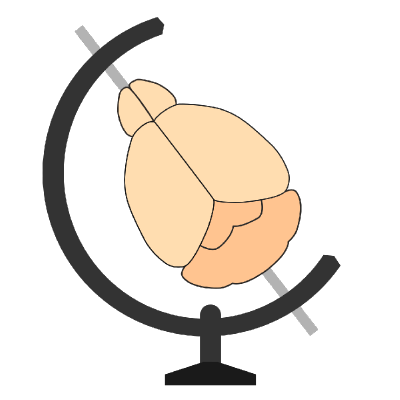Source code for brainglobe_atlasapi.structure_class
"""
Provide a class for representing hierarchical structures,
such as brain regions in an atlas.
"""
import warnings
from collections import UserDict
import meshio as mio
from brainglobe_atlasapi.structure_tree_util import get_structures_tree
[docs]
class Structure(UserDict):
"""Class implementing the lazy loading of a mesh if the dictionary is
queried for it.
"""
def __getitem__(self, item):
"""
Retrieve an item from the structure's data.
If the item is `mesh` and the mesh data is currently None, it attempts
to load the mesh from the `mesh_filename` if available.
Parameters
----------
item : str
The key of the item to retrieve.
Returns
-------
meshio.Mesh or None or any
- If `item` is "mesh" and the mesh data is successfully loaded,
returns a `meshio.Mesh` object.
- If `item` is "mesh" and `mesh_filename` is None, returns `None`.
- For other keys, returns the value associated with the given item,
which can be of any type depending on the stored data.
Raises
------
meshio.ReadError
If `item` is "mesh" and the mesh cannot be read.
The value associated with the given item.
"""
if item == "mesh" and self.data[item] is None:
if self.data["mesh_filename"] is None:
warnings.warn(
"No mesh filename for region {}".format(
self.data["acronym"]
)
)
return None
try:
self.data[item] = mio.read(self.data["mesh_filename"])
except (TypeError, mio.ReadError):
raise mio.ReadError(
"No valid mesh for region: {}".format(self.data["acronym"])
)
return self.data[item]
[docs]
class StructuresDict(UserDict):
"""Class to handle dual indexing by either acronym or id.
Parameters
----------
mesh_path : str or Path object
path to folder containing all meshes .obj files
"""
def __init__(self, structures_list):
super().__init__()
# Acronym to id map:
self.acronym_to_id_map = {
r["acronym"]: r["id"] for r in structures_list
}
for struct in structures_list:
sid = struct["id"]
self.data[sid] = Structure(**struct, mesh=None)
self.tree = get_structures_tree(structures_list)
def __getitem__(self, item):
"""Core implementation of the class support for different indexing.
Parameters
----------
item : str or int
The acronym (str) or id (int) of the requested structure.
Returns
-------
Structure
The Structure requested.
"""
try:
item = int(item)
except ValueError:
item = self.acronym_to_id_map[item]
return self.data[int(item)]
def __repr__(self):
"""Return string representation of the class,
showing all region names.
"""
return self.tree.show(stdout=False)
